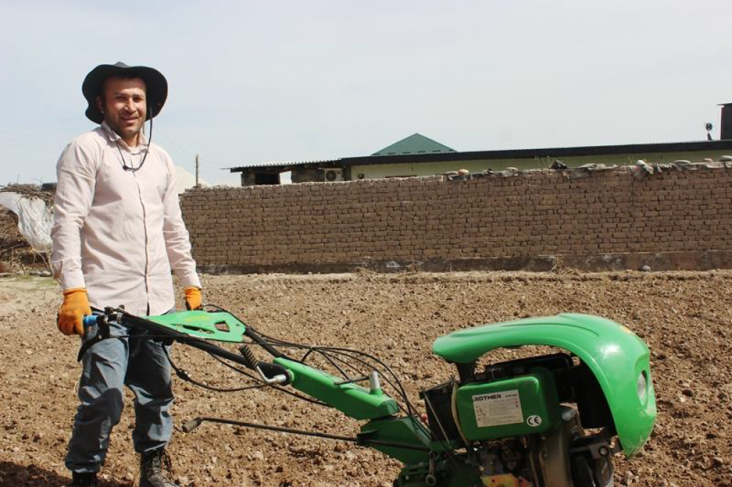Speeches Shim

Murodali Sharipov worked as a labor migrant in Russia for 15 years. In 2017, when he returned to his family and homeland, a remote village in Qushoniyon district in the south of Tajikistan, he was unprepared for the significant challenges that lay ahead.
As a young man, he dreamed of pursuing a military career and entered the Military College in Dushanbe. After studying for three years, he was forced to make the difficult decision to drop out of college after his father died and start supporting his family. Like many other young Tajik men, Sharipovi journeyed to Russia in search of better economic opportunities and began sending money home.
With a heavily remittance-dependent economy, over a million Tajik citizens live and work outside of their home country for most of the year. Due to insufficient knowledge of host countries’ languages, legislation, and their own rights, Tajik migrant workers are vulnerable to labor exploitation, and they and their family members are at a greater risk of human trafficking.
When Sharipov decided to return home to marry, “It was the exact time when life for a migrant worker in Russia worsened. Hardened migration legislation, constant police harassment, and Russia’s financial crisis made the conditions impossible. I decided to look for opportunities at home.”
But life at home was not much easier. As the only man and provider for a large family, with little to no job opportunities in the village and only low-paying jobs in the nearest big city, Sharipov had to ask friends for loans to make ends meet. During one of these exchanges, he learned of a local civil society organization, Akhtari Bakht, or “Bright Happiness,” providing grants to former migrants to start their own income-generating businesses.
USAID’s Dignity and Rights project funds Akhtari Bakht and other International Organization for Migration partner NGOs, and works to address challenges concerning migrant workers’ human rights violations, counters trafficking in persons, and supports the reintegration of migrant returnees to their home communities across Central Asia. The USAID project established an emergency fund for provision of basic in-kind support services including legal, medical and reintegration assistance, primarily for victims of trafficking and returned migrants who are extremely vulnerable due to re-entry bans and limited job opportunities.
In Tajikistan, USAID cooperates with the government and civil society organizations to create employment opportunities, provides business reintegration services for returning migrants, and helps improve legal and policy frameworks to protect migrants' rights.
After a detailed review of Sharipov’s request, his experience and job skills, and the needs of his community, the project gave him a small land cultivator to plough soil and a motorbike to transport the equipment for his new business endeavor cultivating land.
The cultivator, and Sharipov’s expertise in using it, was a welcome addition to the community, a small village named Mehnatobod that translates to “flourished from hard work” in Tajik. Here, and in most rural villages in Tajikistan, farming households dig the soil manually, which is exhausting and time-consuming labor. Sharipov immediately began gaining the respect of his neighbors by providing tillage services to his whole village as well as neighboring communities. The land cultivator immediately solved a big problem.
His new enterprise has renewed Sharipov’s self-confidence. He now sees himself as an important member of his community. “I make up to $50 a day during the cultivation season. I doubt that I could earn that much in Russia now. I can afford to purchase medicine for my mother, and I can take care of my whole family. I have also been able to return loans and save part of my earnings,” says a proud Sharipov.
Mohinisso Shohnazarova, the Director of Akhtari Bakht, adds, “We are impressed by how Sharipov works. He has become a man in demand in both his village and neighboring communities. Local people need his services – cheaper and faster tillage of soil, without having to plough with their hands.”
Sharipov has big plans for his future. He recently employed a classmate to help with tilling soil, and with savings he earned from his business, Sharipov plans to buy bulls and begin breeding cattle. He is grateful to the USAID Dignity and Rights project for giving him the opportunity to succeed.
Over the past five years, USAID’s Dignity and Rights project has helped more than 250 returned migrants in Tajikistan. It provided start-up-capital for various types of businesses, including agricultural commodities for cattle breeding and poultry farming, equipment for pastry and confectionery production, sewing workshops, and tools and equipment for construction services. The returning migrants who received assistance to start up businesses increased their monthly income by an average of 13 percent per year. The project gives returning migrants an opportunity to make a living, provide for their families, and stay in their home country close to their family and friends, while contributing to Tajikistan’s economic self-reliance.

Comment
Make a general inquiry or suggest an improvement.